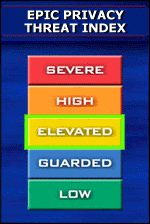In the past, we worried less about privacy.
The issue was there, but abuse was small. And we don't tend to be concerned about theoretical threats. We only care about problems when they become real and touch our lives.
Before the information explosion, we relied on cost as the primary protection of privacy: it was too expensive for anyone (except maybe the government) to assemble, store, cross-index and correlate the information.
Today, the information explosion has driven down costs.
 | |
The original MS-DOS operating system could only handle data storage up to 32 MB. No one could imagine needing more. In August 2000, Maxstor introduced their new PC disk drive storing 80 gigabytes and selling for $350.00 (or less!). In February 2004, I checked local retail prices and found an external, 250 gigabyte hard drive for $380.00. In May 2005, a comparable 250 GB drive was $330 (a 15% increase in disk per dollar in 15 months).
Today your buying profile can be captured from that discount card you use at the grocery store. Is that a problem? The next time you apply for a job or for insurance, would you want all the information about all the over-the-counter drugs purchase to be available for review?
Today, Megan's Law calls for the disclosure to neighbors when a convicted sex offender moves into a neighborhood. How would you feel about disclosure to neighbors of all legal history whenever anyone moves in?
Or consider this:
"The real danger is the gradual erosion of individual liberties through the automation, integration, and interconnection of many small, separate record-keeping systems, each of which alone may seem innocuous, even benevolent, and wholly justifiable."
— U.S. Privacy Protection Study Commission, 1977
The information age has given us the ability to threaten privacy in everyday commerce.
These pages will not provide answers. But I hope they can help define the questions.



No comments:
Post a Comment